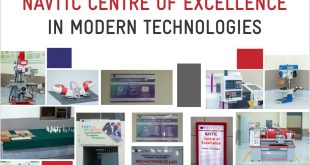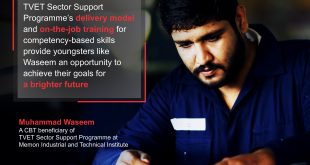Skills that give you a “cutting” edge In a corner of a well-lit, spacious and dirt-less hall, some young girls donning laboratory uniforms can be seen standing in a group. They carry sharp instruments in their hands and after talking to each other briefly they bend over a table lying right there in the middle. Within moments their hands start moving in a mechanical fashion.
Oblivious to the activity around them, they are fully focused on the work they have been assigned by their male instructor who stands at a close distance. Feeling satisfied by the display of skills by this group, he nods his head in appreciation and slowly moves toward the next station where another group of female students awaits him.
Getting closer to the work station, one can see these girls applying sharp butcher knives on loaves of meat and carving out identically shaped and sized meat cubes in a highly professional manner. They exactly know how much pressure they need to apply on meat, how to hold the knife and how to ensure there are no rough edges. Only the perfectly cut pieces will be approved for packing. They also know the presentation should be such that hardly anyone can resist the temptation of buying the product once it is displayed on the shelf.
how to hold the knife and how to ensure there are no rough edges. Only the perfectly cut pieces will be approved for packing. They also know the presentation should be such that hardly anyone can resist the temptation of buying the product once it is displayed on the shelf.
Looking at the skills they exhibit, one can hardly imagine that few months ago many of these girls could not even bear the sight of blood or think of touching the paraphernalia they are using now with professional ease. The fact that they can easily slaughter chickens and peel off their skins is a proof of how they have overcome their fears and inhibitions.
For those getting curious, the information that follows will explain the situation and the context. The venue of this activity is the Punjab Vocational Training Council’s (PVTC’s) Vocational Training Institute (VTI) in Green Town Lahore. The girls at work are the students of the first batch of the six-month Halal Butcher training course introduced by PVTC.
The initiative is supported by the Fund for Innovative Training (FIT) created under the Technical and Vocational Education and Training (TVET) Reform Support Programme (RSP). TVET-RSP is a multi-lateral initiative co-funded by the European Union, the Embassy of Netherlands and the Federal Republic of Germany and implemented in Pakistan by Deutsche Gesellschaft fürInternationale Zusammenarbeit (GIZ) GmbH.
The programme which is spread over two years primarily targets rural youth of poor landless families and has two segments, says Shafqat-ur-Rehman, head of PVTC’s Research and Development (R&D) Cell. Under the segment 1, he says, there are plans to train 240 boys and girls in the trade of halal butchery whereas under the segment 2 professional butchers will be trained on health and hygiene and familiarized with best practices related to this profession.
He says there is immense potential in the field of halal butchery and countries such as those in the Middle East region, Australia, Canada, European Union and others need halal butchers in large numbers. A lot of trainees enrolled in this course want to avail immigration facilities after getting certification in this trade from the council, he adds. Besides, he says, there are many job opportunities in slaughter houses, branded meat shops, export-oriented concerns and so on. PVTC will be the first organization to offer certification in this trade which will make its students a rare and a highly sought after commodity in the job market.
 The halal butchery course is offered to male and female students free of cost. The students are offered Rs 2000 per month in stipend, free uniform and free text books during this six-month training course. The students have access to latest machinery and equipment in a state of the art laboratory set up under this project. The ratio of theory to practical sessions in 20:80 and the trainees are taken to slaughter houses, meat stores, meat processing units, meat packaging plants etc for exposure.
The halal butchery course is offered to male and female students free of cost. The students are offered Rs 2000 per month in stipend, free uniform and free text books during this six-month training course. The students have access to latest machinery and equipment in a state of the art laboratory set up under this project. The ratio of theory to practical sessions in 20:80 and the trainees are taken to slaughter houses, meat stores, meat processing units, meat packaging plants etc for exposure.
SajidaParveen, a trainee who is married and comes from a nearby locality in Green Town, says she was excited when she saw the ad about this programme and did not waste time in submitting her application form. She says once finished with her course she will try for a job at K&N, Menu, Dawn or some other food processing company and at one point in life also go for setting up her own meat business. She is quite confident she will find a job soon after certification: “I have done a survey and observed that mega stores, departmental stores and meat shops prefer to have girls as sales personnel.”
The trainees also get the opportunity to get in touch with the players in meat trade market. For example, Muhammad Umar Qureshi-the trainer of the course-comes from a family of traditional butchers. His family runs a training institute with the name of Redcow Meat Training Institute which is affiliated with PVTC. He says they are into meat export business for long. Besides, they have sent certified butchers to Tokyo, Brimingham, Torontoetc and also have demand from different cities in Australia.
He says they are into meat export business for long. Besides, they have sent certified butchers to Tokyo, Brimingham, Torontoetc and also have demand from different cities in Australia.
Umar hopes the trainees of this course will also have the option of leaving for greener pastures. He says they are being taught on how to adopt healthy practices in this procession. For example, he says, they are taught not to use rusty knives with wooden handles and told to go for food-grade knives made of stainless steel.
Similarly instead of using wood log to cut and pierce meat lying on it they are asked to use Teflon sheet for this purpose. The Teflon sheet, he says, is preferred for the reason that the pores in the log are house to bacteria which contaminates the meat whenever it is placed there. The Teflon sheet on the other hand is clean, strong enough to avoid cuts and free of bacteria.
Umar says male trainees are taught how to slaughter animals (cows, goats, sheep etc) and ensure blood escapes the body properly, remove the skin, cut the carcass into pieces etc. The female trainees, on the other hand, are taught on how to make pieces of meat, cut bones mechanically, pack the meat properly and so on. They can only slaughter chicken, he adds.
The students are also trained on how to operate bone saws, mincers and slicers and ensure ante-mortem and meat shop hygiene. SumeraIshaq, 18, is a trainee who visited the VTI to get enrolled in stitching class. Here she came to know about halal butchery course, got interested in it and told her father about the opportunity when she returned home. She said her father approved the idea and she joined the halal butchery course.
Sumera has plans to apply for job at some departmental store which has a separate section for meat and poultry products. They offer Rs 12,000 to Rs 13,000 to entry level employees and the package of supervisors is much better, she adds.

Munir Rajput, Admission & Placement Officer, VTI, Greentown says the response to the advertisement about halal butcher course was great. A lot of people were submitted their applications for the course and those who could not be accommodated in the first batch will be given a chance later on.
He says traditionally this skill has remained confined to butcher families who have trained very few people from outside. Therefore, the PVTC course is a blessing for many who can get certification and enter the highly lucrative global job market. There is a case where a female trainee wants to apply for immigration as principal applicant once she gets her certification, and move abroad with her family if her application is approved, Munir concludes.
 Pakistan TVET REFORM Support Programme Technical and Vocational Education and Training (TVET) Reform support Programme
Pakistan TVET REFORM Support Programme Technical and Vocational Education and Training (TVET) Reform support Programme









